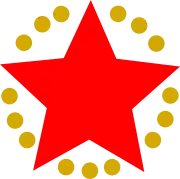| Chairman of the Standing Committee of the Supreme People's Assembly | |
|---|---|
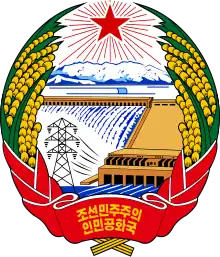 | |
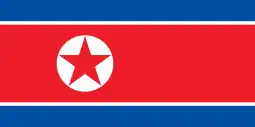 | |
| Standing Committee of the Supreme People's Assembly | |
| Type | Presiding officer |
| Appointer | Supreme People's Assembly |
| Term length | Same as the term of the Supreme People's Assembly |
| Inaugural holder | Kim Tu-bong |
| Formation | 8 September 1948 |
| Chairman of the Standing Committee of the Supreme People's Assembly | |
| Chosŏn'gŭl | |
|---|---|
| Hancha | |
| Revised Romanization | Choego inmin hoeui sangim wiwonhoe wiwonjang |
| McCune–Reischauer | Ch'oego inmin hoeŭi sangim wiwŏnhoe wiwŏnjang |
 |
|---|
|
|
The chairman of the Standing Committee of the Supreme People's Assembly of the Democratic People's Republic of Korea (Korean: 조선민주주의인민공화국 최고인민회의 상임위원회 위원장), formerly known as the president of the Presidium of the Supreme People's Assembly of the Democratic People's Republic of Korea, is the presiding officer of the Standing Committee of the Supreme People's Assembly, which is the highest institution of state power in North Korea when the Supreme People's Assembly is not in session.[1][2] The current chairman of the Standing Committee is Choe Ryong-hae, who was chosen on 11 April 2019.[3]
History
The 1948 Constitution created the position of Chairman of the Standing Committee of the Supreme People's Assembly.[4] The chairman presided over the Standing Committee of the Supreme People's Assembly, which was given the power to ratify or annul treaties with foreign countries, appoint or recall ambassadors to foreign countries and receive letters of credentials or recall of foreign diplomatic representatives.[5] This made the chairman of the SPA Standing Committee the de jure head of state of North Korea. Nominally, the Chairman of the SPA Standing Committee held the highest state post followed by the premier, Kim Il Sung.
The 1972 Constitution created the position of President of North Korea who is tasked with being the country's head of state.[6] The Chairman of the Standing Committee of the Supreme People's Assembly (under the new Korean title of 최고인민회의 상설회의 의장) was removed of its power to represent the state and was limited to doing legislative work as the concurrent chairman of the Supreme People's Assembly.[7]
The 1998 revision of the 1972 Constitution created the position under the new English translation of President of the Presidium of the Supreme People's Assembly with its powers as head of state restored.[8] However, the 1972 Constitution was revised in April 2019 to designate the then-Chairman of the State Affairs Commission as the head of state, with the powers reserved to the head of state being transferred to the SAC chairman in August of the same year.
In February 2022, the Chairman of the State Affairs Commission began to be referred in English as the President of the State Affairs. This led to the President of the Presidium of the Supreme People's Assembly being referred in English to its previous title of Chairman of the Standing Committee of the Supreme People's Assembly.
Duties and responsibilities
According to the North Korean constitution, the chairman presides the Standing Committee of the Supreme People's Assembly and represents the state in receiving the letters of credentials and recall of foreign diplomatic representatives.[2]
List of office holders
| No. | Portrait | Name (Birth–Death) |
Term of office | Party | SPA | ||
|---|---|---|---|---|---|---|---|
| Took office | Left office | ||||||
| 1 | 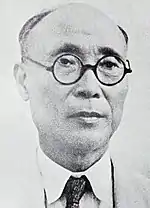 |
Kim Tu-bong 김두봉 (1889–1958) |
8 September 1948 |
20 September 1957 |
Workers' Party of North Korea (until 1949) |
1st | |
| Workers' Party of Korea (from 1949) | |||||||
| 2 | 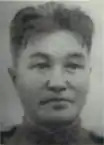 |
Choe Yong-gon 최용건 (1900–1976) |
20 September 1957 |
28 December 1972 |
Workers' Party of Korea | 2nd | |
| 3rd | |||||||
| 4th | |||||||
| 3 | 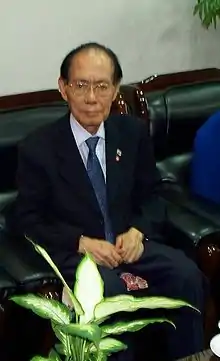 |
Hwang Jang-yop 황장엽 (1923–2010) |
28 December 1972 |
7 April 1983 |
Workers' Party of Korea | 5th | |
| 6th | |||||||
| 7th | |||||||
| 4 | Yang Hyong-sop 양형섭 (1925–2022) |
7 April 1983 |
5 September 1998 |
Workers' Party of Korea | |||
| 8th | |||||||
| 9th | |||||||
| 5 | .jpg.webp) |
Kim Yong-nam 김영남 (born 1928) |
5 September 1998 |
11 April 2019 |
Workers' Party of Korea | 10th | |
| 11th | |||||||
| 12th | |||||||
| 13th | |||||||
| 6 | .jpg.webp) |
Choe Ryong-hae 최룡해 (born 1950) |
11 April 2019 |
Incumbent | Workers' Party of Korea | 14th | |
References
Citations
- ↑ Socialist Constitution of the Democratic People's Republic of Korea, Article 113
- 1 2 Socialist Constitution of the Democratic People's Republic of Korea, Article 117
- ↑ "In full: promotions and demotions at North Korea's 14th SPA". NK PRO. Korea Risk Group. 12 April 2019. Retrieved 17 April 2019.
- ↑ Constitution of the Democratic People's Republic of Korea (1948), Article 48
- ↑ Constitution of the Democratic People's Republic of Korea (1948), Article 49
- ↑ Socialist Constitution of the Democratic People's Republic of Korea (1972), Article 89
- ↑ Socialist Constitution of the Democratic People's Republic of Korea (1972), Articles 86 and 87
- ↑ Cha & Hwang 2008, p. 198.
Sources
- Works cited
- Cha, Victor D.; Hwang, Balbina Y. (2008). "Government and Politics". In Worden, Robert L. (ed.). North Korea: A Country Study (5th ed.). Washington, DC: Federal Research Division of the Library of Congress. pp. 187–234. ISBN 978-0-8444-1188-0.
